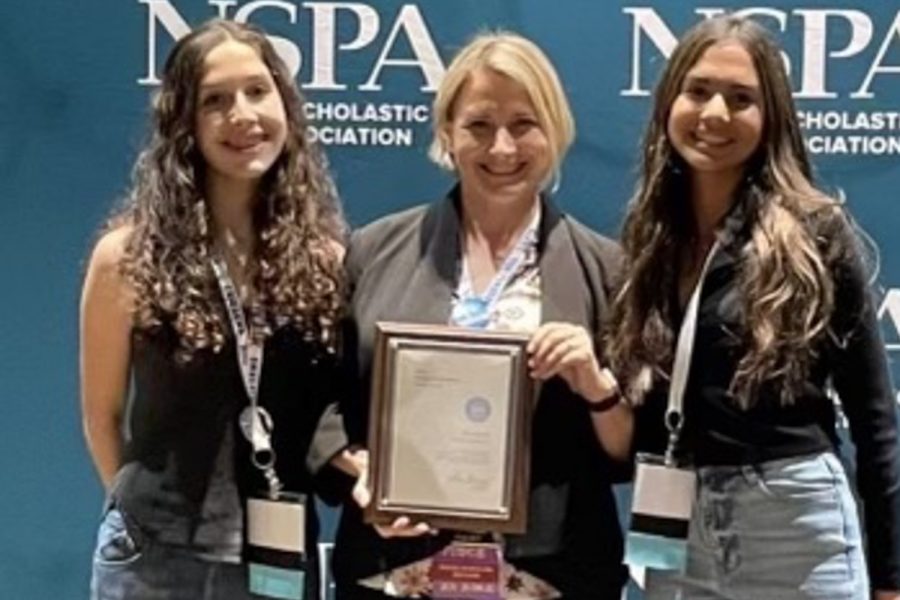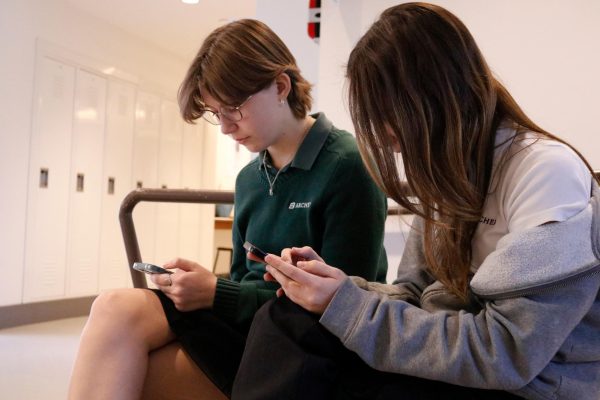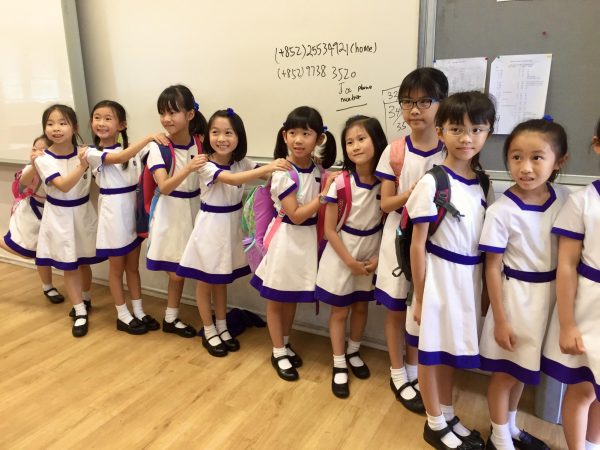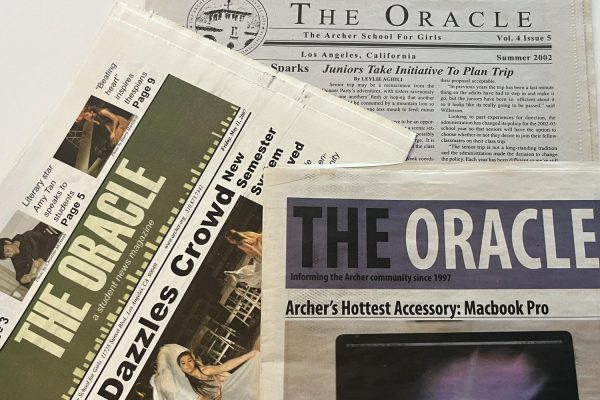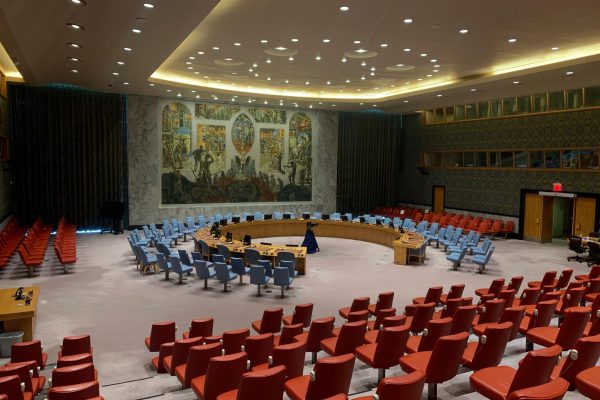Commentary: Celebrating Student Press Freedom Day with bold journalism, brave advocacy
Photo credit: Emma Winkler
Staff Reporters Lucia Williams (’25) and Surya Patil (’25) and journalism adviser Kristin Taylor accept the 2022 Online Pacemaker Finalist award at the 2022 National High School Journalism Convention. This award recognized high school news sites for journalistic excellence.
February 24, 2023
For the fourth day of Scholastic Journalism Week and Student Press Freedom Day Feb. 23, we want to highlight the importance of student press freedom for the day’s theme: bold journalism and brave advocacy.
As the only two freshmen in our journalism class last year, the topics we discussed during the first weeks of instruction were completely new to us. We learned the basics of a good interview, how to structure an article, the reporter’s code of ethics and eventually press freedom. During the first lesson about this subject, our journalism adviser Kristin Taylor taught us the meaning of press freedom, and she introduced us to the Reporters Without Borders’ map ranking countries’ press freedom around the world.
Hours later, we were still exploring the world of violence and censorship in countries where voices were suppressed, articles were scrapped and journalists were killed for publishing information aspersing corporations and governments. We were shocked; our limited perspectives had led us to believe that staying informed is a basic human right. We were so used to the extent of freedom in the Los Angeles press that we rarely thought of our freedom as a privilege.
Specifically, in Iran, press law limits journalists’ freedom, leading to punishments as harsh as death for journalists who exercise the watchdog role. Article 3 of Iranian Law states, “The Press has the right to publish and bring to the public’s attention the people’s and the officials’ views, constructive criticisms, suggestions [and] explanations in accordance with Islamic values and society’s interests.” The article’s vague guidelines on what the press has the right to publish enables Iran’s government to censor the press and limit their freedom.
Although our press freedom in the U.S. is excellent compared to countries that are controlled by totalitarian regimes, such as North Korea, our home country was placed 43rd. We wondered how this could be since our freedom is written into our very first amendment.
Fifteen billionaires and six corporations own most of the U.S. news media outlets. These billionaires’ and corporations’ monopoly over the media is the primary reason for why press freedom in the U.S. has visible limits. It is no secret that when a person or corporation owns a news media outlet, they have some influence over what is published and the outlet’s agenda-setting. This bias limits the U.S.’s overall press freedom.
Although it may not be recognized as such, student journalism holds as much importance as these news corporations. Similar to the news corporations, but on a considerably smaller scale, we hold watchdog, gatekeeper and agenda-setter roles in our school community. Archer has a phenomenal press policy: we are free to do a journalist’s job without censorship. For the eighth consecutive year, Archer has won the First Amendment Press Freedom Award.
Student media at Archer connects directly to the school’s mission to “strengthen girls’ voices” and “promote challenge-seeking and support risk-taking” in order to “graduate courageous, committed and ethical young women.”
Archer’s student media programs are designated open platforms for student expression where students make all final content decisions in order to teach students responsibility by allowing them to make and defend their own choices. Our student-led editorial board makes all final decisions without faculty intervention. We are trusted to make ethical decisions as responsible journalists are in the real world, but students in other places don’t have this opportunity.
We want to highlight the importance of passing New Voices Bills. These bills are essential in securing press freedoms for schools in states where the First Amendment is not extended to student journalists.
The impact of the 1988 Hazelwood School District v. Kuhlmeier case is felt by student journalists across the nation today. This case led to the retraction of many press freedoms in public schools and allowed administrations to review and restrain student work prior to being published. This censorship makes it nearly impossible for student journalists to uphold the code of ethics composed of four pillars: seek truth and report it, minimize harm, act independently and be accountable and transparent.
In order for student journalists throughout the nation to regain these rights, we must directly reach out to senators and high-ranked officials in states where New Voices Bills are not passed. As a demonstration of bold journalism and brave advocacy, we — along with other members of The Oracle staff — have written letters emphasizing the importance of passing laws that grant student journalists press freedom.
As student journalists who are lucky enough to go to Archer, where we have complete press freedom, it is our responsibility to advocate for those to do not share our experience.





![Freshman Milan Earl and sophomore Lucy Kaplan sit with their grandparents at Archer’s annual Grandparents and Special Friends Day Friday, March 15. The event took place over three 75-minute sessions. “[I hope my grandparents] gain an understanding about what I do, Kaplan said, because I know they ask a lot of questions and can sort of see what I do in school and what the experience is like to be here.](https://archeroracle.org/wp-content/uploads/2024/03/grandparents-day-option-2-1200x800.jpg)













































